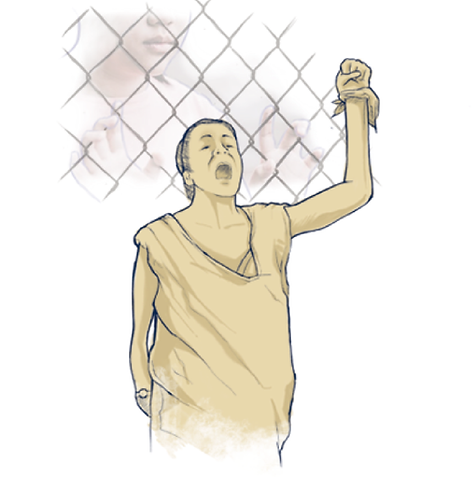
Melkis Faure Hechavarria
Patriotic Union of Cuba
Imprisoned since: August 6, 2016
Sentence: 5 years and 4 months, beginning October 23, 2017
Charges: Public Disorder, two charges of Contempt, Assault and Illicit Economic Activities
Correctional Facility: Ceiba Work Camp # 4, Artemisa Province
On the day that she was detained, Melkis Faure Hechavarría did not yet know that she was pregnant. On August 6, 2016, she set out to take part in a protest organized by the Patriotic Union of Cuba (UNPACU), marching peacefully down Calle Monte in Old Havana. When police approached the group, she fell to the ground and refused to fight back, inspired by the philosophy of Mahatma Ghandi. Melkis has not returned to her home since that day.
The police took Melkis to the Sanja police station and then to El Vivac prison, where she was held for 46 days without being charged with any crime. According to her husband Freddie Michel, Melkis realized that she was pregnant during this period, but suffered a miscarriage in prison. She was not allowed to see her family while being held at El Vivac, forcing her to suffer alone.
After 46 days, Melkis was transferred to El Guatao prison, where she was finally allowed to visit with Freddie. A few weeks later, Melkis began to suspect that she was pregnant again.
“When we realized that she might be pregnant, we requested for her to be sent to a doctor, but the prison staff just checked her briefly and told her it was a fibroid,” says Freddie. The doctor who checked Melkis wrote her a prescription, but the drugs that she was prescribed were contraindicated for pregnant women. Before long, this medical negligence would have tragic results. “Later on, she started bleeding, and it was then that she suffered another miscarriage,” Freddie remembers.

Activism
Melkis, today 42 years old, became an activist in 2013 by joining the renowned Damas de Blanco. As a homemaker and a mother of five, she knew first-hand the struggles of Cuban women facing poverty. Although she had requested assistance from the state to obtain secure housing several times, she never received it. Inspired by this experience, she later joined UNPACU and raised her voice about the injustices perpetrated by the Cuban state.

“She maintains her position as an opositora, [opponent of the government], she has never changed her ideals,” describes Freddie, who is 36.

When Melkis was transferred to El Guatao, she was finally charged with “disrupting public order,” “contempt” and “resistance.” According to the prosecutor, Melkis had “acted publicly against the revolution, meeting with anti-social and counter-revolutionary persons.” In the eyes of Cuban authorities, Melkis’ exercising her right to protest and carry a sign reading “Down with Raul Castro and the thieving customs authorities” was a crime punishable by prison.
A full year after her initial arrest, Melkis was found guilty by a judge and sentenced to three years in prison for “disrupting public order” and “contempt.” She was brought back to court months later over charges of “illicit economic activity,” “assault” and “contempt” stemming from an incident before her arrest. Having been found guilty again, she was given a combined sentence of 5 years and 4 months, beginning from October 23, 2017. Melkis did not receive a fair trial or have access to her own impartial defense attorney in either of these proceedings.
Today
“It’s too much to count, the suffering that goes on here,” Melkis is heard saying in a 2017 audio recording released by UNPACU. Melkis’ situation never improved after her message was recorded. “In El Guatao, there were shortages, she went hungry and she was tortured by the guards,” Freddie says.
In late 2019, Melkis was transferred to Ceiba Work Camp #4 in the province of Artemisa. Although conditions there are better than in El Guatao, Melkis continues to suffer mistreatment and a lack of nutrition. To prevent inmates from demanding humane treatment and respect for their human rights, prison officials threaten them with the loss of privileges such as furlough or with a transfer back to El Guatao.
Melkis´ Family
Two of Melkis’ children have left home and now live with Melkis’ mother. Her three youngest children from a previous relationship, aged 10, 12 and 15 years, are now in Freddie’s care. According to Freddie, it is these children who have been the most affected by Melkis’ detention.
“Taking charge of three children has been life-changing for me. I did it out of love, of course, because I love them and I decided to dedicate myself to them because they truly don’t have anyone else,” says Freddie, who has been obliged to find several jobs to provide for the children.
With the outbreak of COVID-19 in Cuba, the family’s economic situation has grown precarious as travel restrictions and work stoppages impact Freddie’s employment.
Melkis’ sentence is scheduled to end in 2023; the three years remaining are excruciating for her family. “We miss having her at home every day, so that we could all be together as a family, fighting for a better future and for freedom,” concludes Freddie.